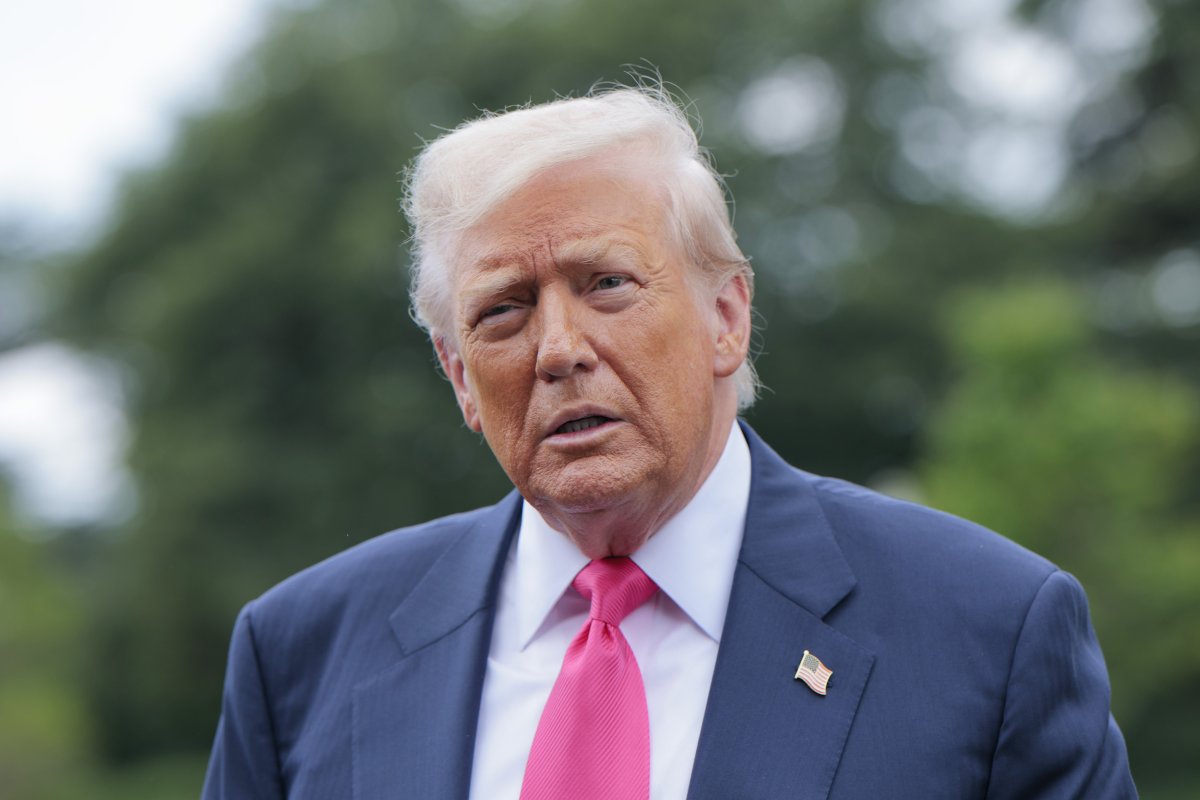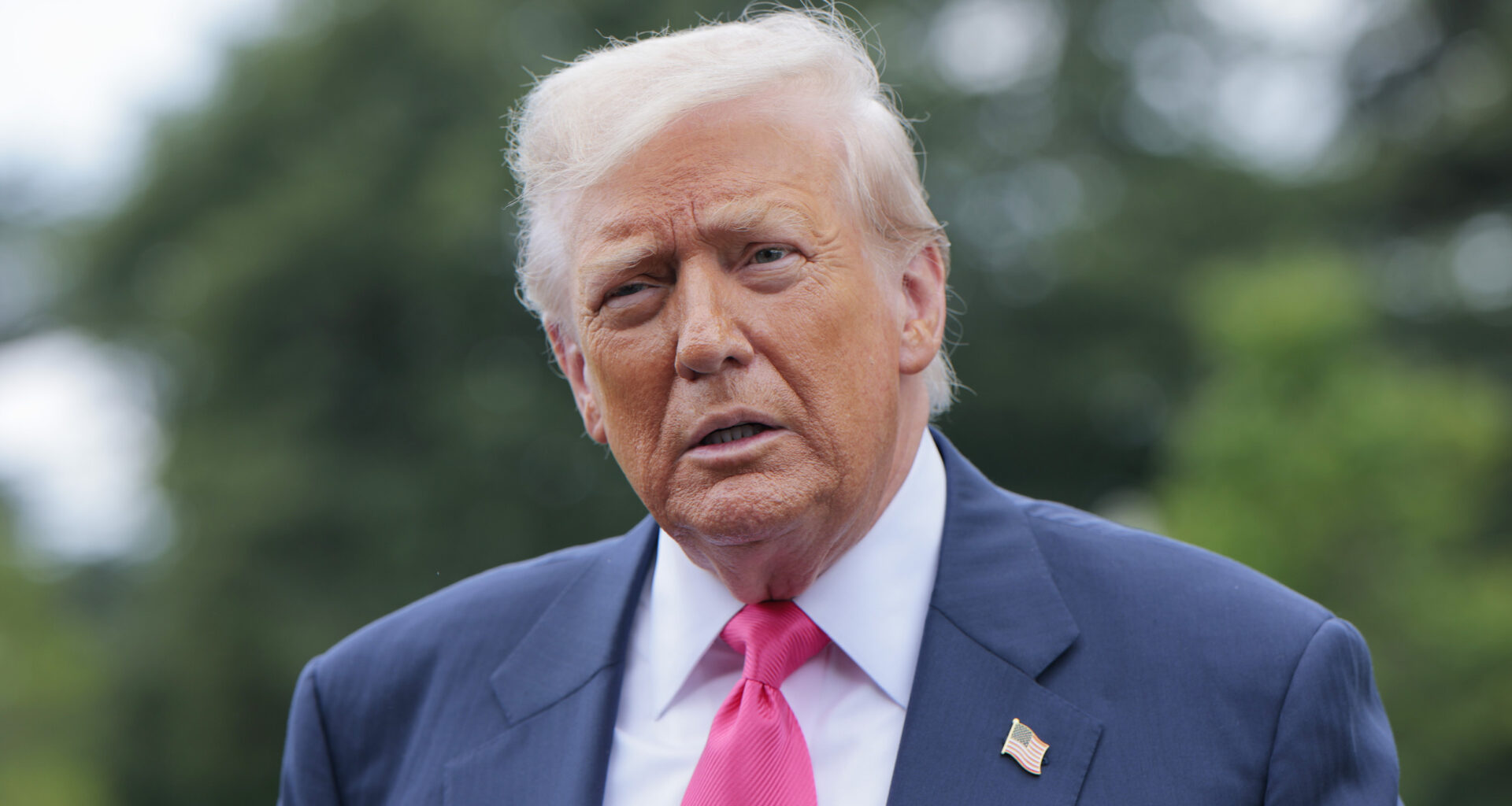President Donald Trump defended the weakening U.S. dollar during a conversation with reporters Friday.
“Well, you know, I’m a person that likes a strong dollar, but a weak dollar makes you a hell of a lot more money,” Trump said in a media Q&A.
Newsweek spoke with financial experts about the matter.
Why It Matters
While the U.S. dollar gained ground Friday, it still set for a weekly drop amid ongoing tariff negotiations and The Fed’s bank meeting scheduled for next week.
This week marks the greatest drop in a month, with the dollar index standing at 97.448. That shows a 1 percent weekly decline, while the euro stayed at $1.1754, close to its four-year high of $1.183.

U.S. President Donald Trump speaks to the media as he departs the White House on July 15, 2025 in Washington, DC.
U.S. President Donald Trump speaks to the media as he departs the White House on July 15, 2025 in Washington, DC.
Anna Moneymaker/Getty Images
What To Know
During Trump’s conversation with reporters, he defended the declining value of the U.S. dollar, arguing that there were actually some benefits to the currency losing value.
“When we have a strong dollar, one thing happens,” Trump said. “It sounds good, but you don’t do any tourism…. You can’t sell anything. It is good for inflation. That’s about it.”
Trump went on to say the U.S. has wiped out inflation.
“I will never say I like a low currency, but you remember the battles I had…with China, with Japan… They always wanted a weak currency. They’re trying to get a weak currency now.”
However, economists have warned that the weakening U.S. dollar is likely to spark a price hike on everyday items while also forcing U.S. travelers to pay more when abroad.
“A weaker dollar does have certain benefits—particularly for multinational corporations and U.S. exporters. It makes American goods more competitive abroad and can boost earnings when foreign profits are converted back into dollars,” Kevin Thompson, the CEO of 9i Capital Group and the host of the 9innings podcast, told Newsweek.
“But let’s be clear: the U.S. is a consumer-driven, import-heavy economy. A weaker dollar makes imports more expensive, which can drive inflation. So while there are benefits on the corporate side, it also hurts households by increasing the cost of everyday goods.”
Thompson also said Trump’s comments on inflation were incorrect, as consumers are still facing price increases in many areas.
“He’s dead wrong,” Thompson said. “We’re still seeing elevated prices in areas like energy, particularly piped gas, and in household essentials. Food costs continue to climb, especially meat, and many families are seeing higher utility bills. Disinflation doesn’t mean prices are falling—it just means they’re rising more slowly, but they’re still rising.”
In June, the consumer price index for all urban consumers climbed 0.3 percent, seasonally adjusted. Meanwhile, food was up 3 percent year-over-year, not seasonally adjusted.
So far this year, the dollar has dropped more than 10 percent in value relative to foreign currencies from many of America’s trading partners.
Thompson said the U.S. dollar’s weakness stems from a mix of concerns over U.S. fiscal policy.
“Continued deficit spending and ballooning debt levels have led to questions about long-term economic stability. Since the dollar is the world’s reserve currency, its strength is tied to global trust in our economy,” Thompson said.
Trump’s ongoing tariff negotiations have also signaled alarm amongst some economists, who say that the heightened tariffs could be passed along by importers via higher prices.
What People Are Saying
Peter Schiff, chief economist and global strategist at Europac.com, wrote on X: “Trump said he wants a strong dollar but he also wants a weaker dollar. He says a strong dollar makes you feel better, but a weak dollar makes you richer. He also claimed he crushed inflation. His policies are highly inflationary. Trump’s weak dollar dream will be a nightmare.”
Alex Beene, a financial literacy instructor for the University of Tennessee at Martin, told Newsweek: “A weaker dollar can have some benefits, namely in the form of cheaper exports which can boost demand for our goods and services internationally. However, the cons can easily outweigh the pros. A weaker dollar equates to higher prices on many items for American consumers, particularly on imports.”
Kevin Thompson, the CEO of 9i Capital Group and the host of the 9innings podcast, told Newsweek: “Despite no rate cuts yet this year, the dollar has weakened due to shifting interest rate expectations and a broader macroeconomic backdrop. Historically, higher U.S. interest rates attract capital, strengthening the dollar—but even with relatively high rates, the dollar is off to one of its worst starts in decades.”
What Happens Next
For everyday Americans, the declining U.S. dollar could continue to impact their wallets after years of inflationary pressures, experts say.
“Inflationary pressures have already left a sizable dent in many Americans’ wallets in the years since the pandemic. Further weakening of the dollar could just prolong this effect,” Beene said.
